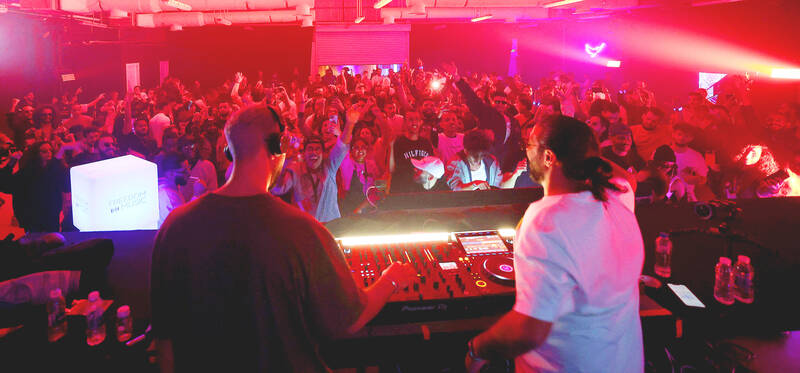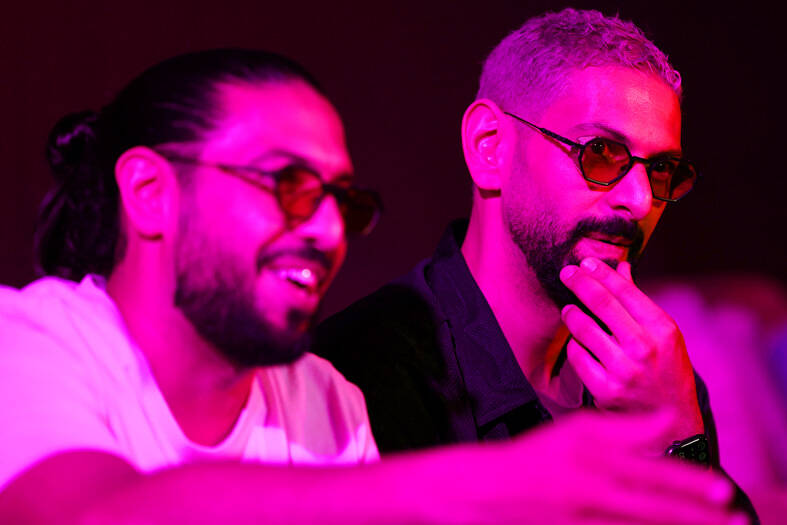Ravers sporting face paint and flashing LED sunglasses jump in time to the thudding beats of Dish Dash, a DJ act whose rise mirrors that of the Saudi Arabian music scene.
The confetti-strewn dance hall in Riyadh is packed with young men and women, most in streetwear hoodies and jeans, a few in traditional white robes and abayas.
The setting bears scant resemblance to the venues where Dish Dash — the Jeddah-born brothers Abbas and Hassan Ghazzawi — began performing more than 15 years ago. Among their early gigs were gender-segregated weddings in which the duo would be walled off from female guests.

Photo: AFP
“They used to lock us in the room. We would stay in this room for five hours and basically DJ for the wall,” Hassan Ghazzawi said, laughing. “The only way you could tell if people are enjoying it is if you hear people are screaming.”
Like other facets of cultural life in conservative but fast-changing Saudi Arabia, the music scene is undergoing a revamp, emerging as a regular stop for top global pop stars from Justin Bieber to Usher and Mariah Carey.
At this past weekend’s MDLBEAST Soundstorm festival, more than 600,000 people took in sets by the likes of Bruno Mars and DJ Khaled, organizers said.

Photo: AFP
DJ Khaled dutifully documented his sampling of Saudi Arabian food and traditional sword dancing for his 31 million Instagram followers.
Such events have helped advertise reforms championed by Saudi Arabian Crown Prince Mohammad bin Salman, who has overseen an easing of rules that once barred cinemas and gender-mixed concerts — albeit during a ramped-up repression of political dissent.
Now, Saudi Arabian performers such as Dish Dash want to take advantage of the opening-up to foster a domestic music industry that can thrive even when the spotlight veers elsewhere.
In between their sets at Soundstorm, Saudi Arabian acts said they were encouraged by the progress so far, pointing to new labels, studios and performance venues that make it easier to build careers.
Not long ago “people used to tell us: ‘Dude, you’re just wasting your time. You’re not doing anything,’ and now people are calling us to get [on] guest lists and stuff like that,” Hassan Ghazzawi said.
Nouf Sufyani, a DJ who performs under the name Cosmicat, said that she only began taking a music career seriously after the first edition of Soundstorm in 2019.
Before that, she had been working as a dentist and DJing on the side, but the buzz around the event spurred her to pursue music exclusively.
Today “I’m 100 percent able to live on music alone, and that should be a push also for anyone who wants to do music and has the talent, but hesitates,” she said.
It is an increasingly common story in a kingdom whose youthful population of 34 million represents a vast underserved market, MDLBEAST chief operating officer Talal Albahiti said.
“I keep telling people this is our new black gold,” he said, a reference to the oil that Saudi Arabia is primarily known for.
“This is the new boom, and it’s all about these creatives and what they bring to the table... I believe the next big hit or superstar will come out of this region,” he said.
However, challenges remain, notably a still-developing network of recording studios that until five or six years ago “were mainly focused on classical Arabic music” and “pretty much neglected all other genres and all other types of artists,” Albahiti said.
The process of setting up rules governing music rights, licensing and royalties is also “in its infancy still,” he added.
On top of that, Saudi Arabia’s alcohol ban could slow the emergence of a club scene that can support artists beyond sporadic festivals.
However, Hassan Ghazzawi said he believed such a scene would ultimately be viable, calling it the logical “next step.”
The changes to date have already captured the attention of artists elsewhere in the region, including from bigger markets such as Egypt. Disco Misr, an Egyptian DJ trio known for up-tempo remixes of Arabic pop classics, first played Saudi Arabia in 2019 and returned to perform in September at the Azimuth music festival in the northern desert city of al-Ula.
That event, more intimate than Soundstorm, attracted a crowd of about 1,000 to a stage nestled between sandstone mountains for two nights of dusk-to-dawn sets.
“Their baby steps are surprising. I cannot call them baby steps. It’s huge... I can only compare what’s happening in Saudi Arabia with Tomorrowland,” Disco Misr member Schady Wasfy said, referring to the Belgian electronic dance festival.
“I cannot compare [it] with anything happening in the Arab region. I’m actually surprised — I’m really surprised, and I’m hoping to see more,” he said.

A string of rape and assault allegations against the son of Norway’s future queen have plunged the royal family into its “biggest scandal” ever, wrapping up an annus horribilis for the monarchy. The legal troubles surrounding Marius Borg Hoiby, the 27-year-old son born of a relationship before Norwegian Crown Princess Mette-Marit’s marriage to Norwegian Crown Prince Haakon, have dominated the Scandinavian country’s headlines since August. The tall strapping blond with a “bad boy” look — often photographed in tuxedos, slicked back hair, earrings and tattoos — was arrested in Oslo on Aug. 4 suspected of assaulting his girlfriend the previous night. A photograph

‘GOOD POLITICS’: He is a ‘pragmatic radical’ and has moderated his rhetoric since the height of his radicalism in 2014, a lecturer in contemporary Islam said Abu Mohammed al-Jolani is the leader of the Islamist alliance that spearheaded an offensive that rebels say brought down Syrian President Bashar al-Assad and ended five decades of Baath Party rule in Syria. Al-Jolani heads Hayat Tahrir al-Sham (HTS), which is rooted in Syria’s branch of al-Qaeda. He is a former extremist who adopted a more moderate posture in order to achieve his goals. Yesterday, as the rebels entered Damascus, he ordered all military forces in the capital not to approach public institutions. Last week, he said the objective of his offensive, which saw city after city fall from government control, was to

IVY LEAGUE GRADUATE: Suspect Luigi Nicholas Mangione, whose grandfather was a self-made real-estate developer and philanthropist, had a life of privilege The man charged with murder in the killing of the CEO of UnitedHealthcare made it clear he was not going to make things easy on authorities, shouting unintelligibly and writhing in the grip of sheriff’s deputies as he was led into court and then objecting to being brought to New York to face trial. The displays of resistance on Tuesday were not expected to significantly delay legal proceedings for Luigi Nicholas Mangione, who was charged in last week’s Manhattan killing of Brian Thompson, the leader of the US’ largest medical insurance company. Little new information has come out about motivation,

‘MONSTROUS CRIME’: The killings were overseen by a powerful gang leader who was convinced his son’s illness was caused by voodoo practitioners, a civil organization said Nearly 200 people in Haiti were killed in brutal weekend violence reportedly orchestrated against voodoo practitioners, with the government on Monday condemning a massacre of “unbearable cruelty.” The killings in the capital, Port-au-Prince, were overseen by a powerful gang leader convinced that his son’s illness was caused by followers of the religion, the civil organization the Committee for Peace and Development (CPD) said. It was the latest act of extreme violence by powerful gangs that control most of the capital in the impoverished Caribbean country mired for decades in political instability, natural disasters and other woes. “He decided to cruelly punish all